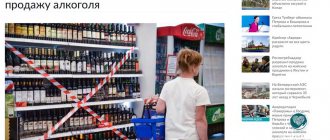Home/Trade/Alcohol sales times in 2021
According to clause 9 of Article 16 of Federal Law 171, the time when the sale of alcohol is permitted in Moscow and regions of the Russian Federation in 2021 is limited to 8:00 - 23:00. Each individual region has the right to change the permissible time range towards tightening at the discretion of the management apparatus.
The state's alcohol policy is constantly changing, and 2021 is no exception. The adoption of new amendments to the main law and additional bills should lead to increased transparency of sales in the alcohol production market. The introduction of additional collection measures is intended to increase the degree of responsibility on the part of both sellers and buyers.
Federal Law on the sale of alcoholic beverages
The Federal Law was adopted due to the large-scale uncontrolled spread of
alcohol, which was the catalyst for many crimes and other actions that are dangerous to the life of society. The federal act is designed to control and
reduction of drinking, sale, production of alcoholic and alcoholic liquids by production structures.
Basic provisions of the law on the sale of alcohol
The circulation of alcoholic beverages in the country is regulated by Federal Act No. 171, adopted by the Duma in 1995 and approved by the President of Russia. The law is designed to protect moral values, a healthy lifestyle, and the legitimate interests of the country's citizens.
Implies the law on alcohol (sale, storage, production) and promoting the economic security of the Federation. This can be achieved by regulating the volume, production process and circulation of alcoholic and alcoholic liquids. Consumers using the products mentioned are not exempt from the law.
A kind of capitulary on alcohol has 28 headings, 4 chapters of the following meaning:
- stipulates the scope of the law, its ultimate goals, methods and powers of federal and municipal authorities regarding the regulation and reduction of the circulation of illegal alcohol.
- The second provides requirements for the manufacture of alcohol-containing and similar products, labeling, documentation, declaration, circulation, and sale.
- The third establishes the rules for registering such drinks and obtaining the necessary license for their production.
- The fourth is control over compliance with the Law and responsibility for its non-compliance.
The last chapter provides methods for monitoring the implementation of this legislation, the degree of responsibility for ignoring it.
The scope of the Federal Law is stipulated by the 3rd part of Article 1. It includes the following provisions:
- Private production of ethanol that is not intended for sale.
- The turnover of alcoholic drugs included in the list of medicines, except for ethanol, which goes to pharmaceutical companies for household needs.
- Sale, production by pharmacies of products with C2H5OH (alcohol).
- Turnover of goods in metallized aerosol containers of less than 450 ml and not intended for drinking.
- Import and export operations with alcoholic beverages supplied for diplomatic and various consular needs.
- These procedures are intended to be exhibited in sample form and to be certified. Products for display are limited to 5 units of consumer capacity per title.
- The movement of alcoholic medicines, which are on the state formulary, is carried out by specialized structures.
Watch the video: “What they “drank” in the USSR during Prohibition.”
The sale of perfumes, cosmetics, household chemicals, and personal hygiene products that contain ethanol and are not listed by the mentioned legislation are adjusted by other Government decrees.
Latest Alcohol Sales Law Updates 2021
Changes in Federal Law No. 171 affect producers of hop products, trading organizations and buyers. Everyone will have to switch to new working conditions and drinking alcoholic liquids. Supervisory authorities will have to check not only retail sales, but also the network.
The law on the sale of alcohol from January 1, 2021 puts into effect the following mechanisms:
- Promotions of strong drinks via the Internet are prohibited.
- There is a mandatory registration of equipment and installations that produce alcohol.
- Private individuals are prohibited from transporting more than 10 liters. alcoholic liquid without indicating excise parcels on it.
- The accounting system for alcoholic products - EGAIS, provides effective control over the sale of intoxicating drinks.
- Penalties for violating anti-alcohol laws, which provide for more than just monetary penalties, are being increased.
The last point is reflected in the codified act on administrative responsibility - the Administrative Code, namely:
- Article 14.16. Violation of the rules for the sale of alcohol;
- Article 14.17. Violation of requirements for production or alcohol products;
- Article 14.17.1. Illegal retail sale of alcohol by individuals;
- Article 14.17.2. Illegal movement of alcohol by individuals;
- Article 14.18. Use of ethanol for the production of alcohol-containing products;
- Article 14.19. Violation of state accounting (USAIS) of production and circulation of alcoholic beverages.
Considering local and regional legislation, we can conclude that additional measures have also been taken on the sale of alcohol.
Legislation
The main legislative act regulating the sale of alcohol-containing products is Law 171 of the Federal Legislation, adopted on November 22, 1995.
Attention! If you have any questions, you can chat for free with a lawyer at the bottom of the screen or call Moscow; Saint Petersburg; Free call for all of Russia.
Attention
According to paragraph 9 of the sixteenth article of this Law, the time when the sale of alcoholic beverages to the population in Moscow and throughout the regions of Russia is permitted is limited to 8:00 - 23:00. Moreover, each individual region has the right to change the permissible time range towards tightening at the discretion of the management apparatus.
Punishments for violating this law on the sale of alcohol in 2021 are regulated by the fourteenth article of the Code of Administrative Offenses of the Russian Federation.
Prospects for new bills on alcohol
The law on the sale of any alcoholic products includes several major changes. One of the requirements provides for sales only in a stationary location equipped with storage facilities, and was owned by the seller of intoxicating drinks.
The requirement implies renting a hospital, but only for long-term use. The established standards can be reduced only for retail outlets that sell weak drinks - up to 12°.
It is proposed to impose a ban on one and a half liter plastic alcohol containers. The latter should reduce the number of beer, cheap wine products, and cocktails sold in such containers.
Responsibility
Attention
In 2021, new articles and amendments to laws will be added, leading to tougher penalties for violating the rules for the sale of alcohol. In addition to fines, these measures now include arrest, community service, and restriction of freedom. A new article on “Illegal sale of alcoholic beverages” has appeared in the Criminal Code of the Russian Federation. Failure to comply will result in a fine of 50 thousand rubles.
We should not forget that under some circumstances, regardless of the volume or name of the drink sold, an organization may receive a fine of up to 100,000 rubles, and may also be subject to forced confiscation of existing alcohol.
Monitoring the implementation of the law on the night sale of alcohol in Moscow and the regions of the Russian Federation in 2021 should be carried out by employees of the prosecutor's office and police. These departments have the authority to conduct inspections in any place - usually these are the points at which complaints are received from citizens. Failure to comply with the law is revealed through a test purchase, which can be carried out by any person who has the authority to conduct investigative and operational activities within the competence of the above bodies.
Additional Information
A controversial issue in judicial practice is the list of units and persons entitled to conduct operational search activities, which does not include local police officers and prosecutors. In view of this, all independent checks carried out by these persons can be considered not legal and the decisions - invalid. The opinions of judicial authorities in such proceedings differ, but this point does not play a decisive role.
Alcohol trade rules
The rules for the sale of alcoholic products this year are designed to reduce the consumption of alcohol-containing products, which seem to limit its sale. They concern those persons involved in sales and consumption.
The concept of “alcohol” in the law
In order to clearly delineate the effect of the legislation, it is necessary to consider the concept that implies an alcoholic drink. Based on the provision, this is considered a drinking liquid containing 0.5 percent alcohol or ethanol fermentation products. However, a number of fermented milk foods, kvass, which contains slightly more than 1% ethanol, are not considered such.
Types of alcoholic products according to the sales law
Products that are considered non-alcoholic due to passing the test are not subject to registration. Beer, which contains up to 4% ethanol, and wine are positioned as such. However, they also contain less than 0.5% alcohol, but do not fall within the scope of the legislative act.
Three Key Objectives of Alcohol Sales Law
Regulation number 171 refers to a liquid that contains alcohol as alcohol.
The following products are considered as such:
- wines of various varieties;
- brandy;
- liqueurs;
- tequila;
- cognacs;
- vodka;
- port wines;
- whiskey;
- absinthe;
- apple or pear Calvados;
- alcoholic drinking tinctures.
The corresponding category is divided into alcoholic beer.
Law and beer
Many consumers are confused as to why a beer is on the list if it contains very little alcohol. The same applies to energy alcoholic liquids. Of course, some exception is made for malt drinks, but it does not remove it from such a group.
For its intended sale, the law mentioned should be studied. The state tax for each type of license provides for the payment of 40,000 rubles, for wholesale sales - 500,000.
Ban on the sale of alcohol at night in certain regions
Federal regulations stipulate the sale of alcoholic liquid after 11 pm until 8:00 am. However, some regional authorities of the country have the right to tighten this law with the help of local regulations.
Those regions where alcohol is sold under time restrictions include:
- St. Petersburg, region – 11:00-22:00;
- Komi – 8:00-22:00;
- Pskov, Arkhangelsk – 10:00-23:00;
- Kirov – 10:00-23:00, weekends – 17:00-23:00.
In Ichkeria, vodka is sold only from 10 to 12 am, while Muslim holidays are completely without alcohol.
Background information with links to laws on time restrictions for the sale of alcoholic beverages by region of Russia
Law prohibiting the sale of alcohol on holidays
In addition to strictly designated hours for selling products, there are some dates when sales cannot be made during the day. The latter are regulated by state and local legal acts.
The first ones highlight the following all-Russian dates:
- Child protection. It implies the refusal of parents, older teenagers, and their friends to drink intoxicating drinks.
- Knowledge. Many schoolchildren celebrate this date in an adult way, organizing a trip to nature or a home feast with the consumption of alcoholic beverages. Store sellers do not sell such products to students, but they are bought by relatives or older people.
- The last call, the beginning of a long vacation, is also not complete without the participation of a bottle of vodka or wine. Therefore, the decision to ban their implementation is legal.
- Proms, according to schoolchildren, become more fun after drinking alcohol. Such a time is set by regional and local authorities, which implies the closure of alcohol stores on the day of the prom.
- Youth. Russian sociologists have come to the conclusion that one of the global problems of the country's younger generation is alcoholism. Therefore, on June 27 you cannot buy wine or vodka in the store.
- Sobriety. Of course, this day goes without various kinds of alcoholic liquids, since even the name implies their absence.
All changes in the trade of strong drinks do not affect public catering structures, where the product has the right to be present in any period of time and quantity. However, for a cafe or restaurant there are also some rules specified by the anti-alcohol law.
Law on the sale of alcoholic beverages to minors
Bills were submitted to parliament to raise the age limit for purchasing alcohol to 21 years, as is done in foreign countries. The main instigator of the new legal act is the state Ministry of Health.
Watch the video: “Selling alcohol to a minor, or the desire of a local police officer to earn extra money”
For now, the age limit for selling alcohol is set at 18 years of age, i.e. According to subparagraph 11 of paragraph 2 of Article 16 of Law No. 171, a ban is imposed on the sale of alcohol to minors, and a citizen of the Russian Federation who has reached the age of eighteen is recognized as an adult (Article 60 of the Constitution of the Russian Federation).
But there are some deviations from the mentioned mark.
Those. According to the Civil Code of the Russian Federation, citizens under 18 years of age are recognized as legally capable in the following cases:
- marriage registration (Article 21 “Citizen’s legal capacity”);
- from the age of 16, if they are employed or engaged in entrepreneurial activity (Article 27 “Emancipation”).
The first part of the “Civil Code (Civil Code) of the Russian Federation” put into effect by Law No. 51-FZ of November 30, 1994 in the latest version of 2020
According to sociologists, a person who has accepted such obligations is automatically considered an adult.
What alcohol is subject to restrictions?
According to the second article of Federal Law-171, in 2021, restrictions on the sale of alcohol cover all drinks containing ethanol and its fermentation products from 0.5% or higher. However, products with an alcohol content not exceeding 1.2% (fermented milk products, kvass) are not considered alcoholic.
For your information
Also, the Federal Law does not apply to products that have undergone appropriate testing and are officially recognized as non-alcoholic. Ethyl alcohol is usually contained in quantities of no more than 0.5 percent.
The official list of drinks available in Federal Law-171 includes all wine and vodka products, as well as any alcoholic tinctures.
Additional Information
Until 2013, beer and other low-alcohol products with an alcohol content of less than 5% were considered an exception and allowed for sale, but later amendments came into force. They equated the above drinks with alcohol, which automatically included them in the general list of prohibitions.
Advertising of alcoholic products
The Act on Advertising Campaigns for Spirits this year fixes provisions according to which producers and organizers of propaganda are obliged to act according to the changed rules. The articles mention that information boards should be mounted no closer than 100 meters from sports or physical education and recreation facilities.
However, during online broadcasts of cultural events, it is allowed to advertise alcohol-containing liquids. The exception is children's and youth competitions.
The legal act stipulates some rules providing for such propaganda.
An advertising alert may not address the following factors:
- printed publications, except for the promotion of wine products and champagne produced in the state;
- paper, audio, video clips intended for teenagers under 18 years of age;
- television, terrestrial or wired radio;
- means of passenger transport;
- sports, educational, preschool, children's, military structures.
Promotion of alcoholic beverages via the Internet is prohibited in accordance with Art. 21 Federal Law No. 38 “On Advertising” (current version 2020).
Law of the Russian Federation No. 38-FZ “On Advertising”, which came into force on March 13, 2006, as amended for 2021
When can you buy alcohol in the constituent entities of the Russian Federation?
In 2021, the ban on the sale of alcoholic beverages in Moscow begins at eleven o’clock in the evening and lasts until eight o’clock in the morning.
Taking advantage of the right to tighten restrictions, some regions of Russia have shifted the time frame for the sale of alcohol, increasing the period of time during which the sale of alcoholic beverages is considered illegal.
Duration of restrictions on the sale of alcoholic beverages by region of the Russian Federation
| Regions | Ban time |
| Khanty-Mansiysk Autonomous Okrug - Ugra | 20:00 – 8:00 |
| Dagestan | 20:00 – 10:00 |
| Nenets Autonomous Okrug | 20:00 – 11:00 |
| Chukotka Autonomous Okrug | 20:00 – 12:00 |
| The Republic of Sakha (Yakutia) | 20:00 – 14:00 |
| Tambov, Tyumen regions | 21:00 – 8:00 |
| Republic of Buryatia, Altai Territory, Vladimir, Ivanovo, Irkutsk, Lipetsk regions | 21:00 – 9:00 |
| Novgorod region | 21:00 – 10:00 |
| Karachay-Cherkessia, Amur and Pskov regions | 21:00 – 11:00 |
| Komi Republic, Arkhangelsk region, Bryansk, Ryazan, Sakhalin regions, Sevastopol | 22:00 – 8:00 |
| Primorsky Territory, Leningrad, Nizhny Novgorod, Novosibirsk regions | 22:00 – 9:00 |
| Kabardino - Balkaria, the Republic of Mordovia, Tatarstan, Udmurtia, the Chuvash Republic, Stavropol Territory, Khabarovsk Territory, Astrakhan Region, Belgorod Region, Kaliningrad Region, Kaluga Region, Kamchatka Territory, Magadan, Omsk, Orenburg, Samara, Saratov, Tver, Tomsk Regions, Yamalo-Nenets Autonomous Okrug | 22:00 – 10:00 |
| Republic of Adygea, Krasnodar Territory, St. Petersburg, Jewish Autonomous Region | 22:00 – 11:00 |
| Republic of Bashkortostan, Ingushetia, Kalmykia, Karelia, Mari-El, North Ossetia - Alania, Khakassia, Chechnya, Krasnoyarsk region, Volgograd, Vologda, Voronezh, Kemerovo, Kostroma, Kurgan, Kursk, Moscow, Oryol, Penza regions, Perm region, Rostov , Sverdlovsk, Smolensk, Ulyanovsk, Chelyabinsk regions, Transbaikalia, Yaroslavl region, Moscow | 23:00 – 8:00 |
| Altai Territory, Kirov Region, Republic of Crimea | 23:00 – 10:00 |
| Tyva | 24:09 – 8:00 |
| Murmansk region | 8:00 – 11:00 21:00 – 23:00 |
| Tula region | 22:00 – 14:00 22:00 – 12:00 (on weekends) |
Nuances
You should know that in the Republic of Chechnya the temporary regime for the sale of alcohol takes into account only low-alcohol drinks, while strong drinks can only be purchased between eight and ten in the morning. This concession was made in the interests of tourists and guests of the republic. It can be noted that these measures allowed the Chechen Republic to enter the top three most sober regions of the Russian Federation.
For your information
In one hundred and three settlements of Yakutia, the sale of alcoholic beverages is completely prohibited.
Only four regions left the restrictions unchanged; in nineteen the time was maintained, but additional restrictions were introduced regarding sales days. Thus, in the Ulyanovsk region, the sale of alcohol on weekends is also completely prohibited, and national holidays in some regions have also been recognized as alcohol-free days.
There is also a unified list of days prohibiting the sale of alcohol for the entire territory of the Russian Federation.
Selling alcohol without a license
In addition to connecting to the state service EGAIS, to trade the mentioned products, you must obtain a license.
An entrepreneur can have a form for the sale of alcohol only after submitting the following documents to the authorities:
- application for a liquor certificate;
- tax payment receipt;
- a certificate from a fiscal organization;
- decision from the structures of the Ministry of Emergency Situations and Rospotrebnadzor;
- document confirming payment of the duty to the Federal Tax Service;
- enterprise registration form;
- statistics register codes;
- certificate of ownership of the premises or a lease contract.
The license is issued for a period of 12 to 60 months, which the entrepreneur has the right to extend.
Buying alcohol online
In 2021, remote purchasing of alcohol-containing products is prohibited, but this does not stop some stores from selling alcohol via the Internet.
Additional Information
For example, an online store can provide an alcohol rental service in Moscow and regions of the Russian Federation: the courier delivers the goods upon request, a rental agreement is drawn up on the spot, after which the goods are left to the customer as a “deposit.” Naturally, alcohol is simply not returned, and the laws are conditionally considered to be complied with.
Currently, the Ministry of Finance is developing a project to allow the online sale of alcoholic beverages, subject to sales control. Thus, the sale of alcohol on the Internet will be allowed in the egais.ru zone, and all other sites will be blocked if they are located bypassing this zone. This law should come into force on July 1, 2021.
IMPORTANT
At the same time, as of January 1, two thousand and eighteen, a new version of Federal Law 149 will come into force, providing for the blocking of any Internet resource that places advertising on its site for the sale of alcohol.
From the beginning of 2021, advertising the sale of alcoholic beverages on the Internet entails liability in the form of a fine:
- from three to five thousand rubles – for individuals;
- from twenty-five to forty thousand rubles – for officials;
- from one hundred to three hundred thousand rubles – for legal entities.
Accounting for sales of alcoholic products
The new electronic control - EGAIS, will allow you to take into account all strong products sold. Using the system will exclude illegal alcoholic products from sale. It guarantees the creation of a complete database of domestic and foreign-produced drinks that are on sale.
To carry out the method, special scanners will be located at the cash desks, which are designed to read information from the excise parcel and transmit it to the main database via the Internet. The information is also present on the sample check. Thus, the buyer receives information about the purchase of legal alcoholic goods.
Parliamentarians are considering a project that provides special conditions for brandy trade. This will limit the entry into stores and sale, especially for bottling, of illegal cognac. It is also planned to separate this product into a separate group of strong alcoholic drinks, which will allow customers to purchase high-quality alcohol and make the work of regulatory authorities easier.
Restrictions on the retail sale of alcohol in the regions of the Russian Federation
Trading enterprises will fill out an accounting journal that reflects data on the sale of alcoholic liquids and their characteristics.
The form contains the following information:
- code, name, product number;
- index of the type of alcoholic product;
- implementation date;
- number of bottled containers in stock and sold.
Information about deliveries may not be reflected in the form, but the latter may be contained in paper or electronic form. Based on the information entered, you must fill out a tax return once a quarter.
Where can you buy alcohol at night?
At night, you can purchase alcoholic beverages without violating the law only in public catering establishments, which include:
- cafe;
- restaurants;
- buffets;
- bars;
- pubs.
In 2021, the EGAIS system began to be actively used, which displays all information about the movement of alcohol. Thus, license holders for catering establishments must register in this system the fact of opening each bottle of alcoholic beverage. This made it possible to ensure that the sale of alcohol “to-go” in the above-mentioned establishments is not legal.
Additional Information
However, legal purchase of alcohol is possible for persons who are supply agents in places authorized to sell alcohol at night. You can also order a souvenir at home, with the seller offering alcohol as a bonus.
Responsibility under the law
Trading structures or private entrepreneurs have the right to be fined if they are caught selling spirits at retail after 11 pm, which is prohibited by law. This is stated in the sections of the codified torts act.
Subjects of the Federation also provide for punishment for such a violation. All of them are based on the imposition of penalties in the amount of 100,000 rubles, with complete confiscation of products.
The restrictive legal act sets out a list of places where intoxicating liquid cannot be sold.
These include the following objects (clause 3 of article 16 of the Code of Administrative Offences):
- children's educational, medical structures, territories adjacent to them;
- departments of culture;
- strategic points of particular importance;
- public transport units;
- station buildings.
When placing trade stalls near the listed structures, the physical owner is subject to a fine of up to 15,000, and the legal owner - 300,000 rubles, with the alienation of the goods.
Where it is prohibited to sell alcohol in Moscow and regions of the Russian Federation
In 2021, there is a list of places where the sale of alcohol in Moscow and regions of the Russian Federation is prohibited, regardless of its strength and time of day. The list of these locations includes:
- all institutions related to children's education (schools, kindergartens, sports institutions, etc.), objects whose owner has not been identified, and all areas adjacent to them;
- cultural objects, except in cases where the organization has completed the provision of catering services;
- military, strategic objects, as well as objects of national importance and all nearby territories;
- all types of transport engaged in public transportation;
- bus stations, airports, railway stations and potentially dangerous places with large crowds of people.
Selling alcohol in the above-mentioned places entails a fine of ten to fifteen thousand rubles for individuals and two hundred to three hundred thousand rubles for legal entities with permission to confiscate all available alcohol.










